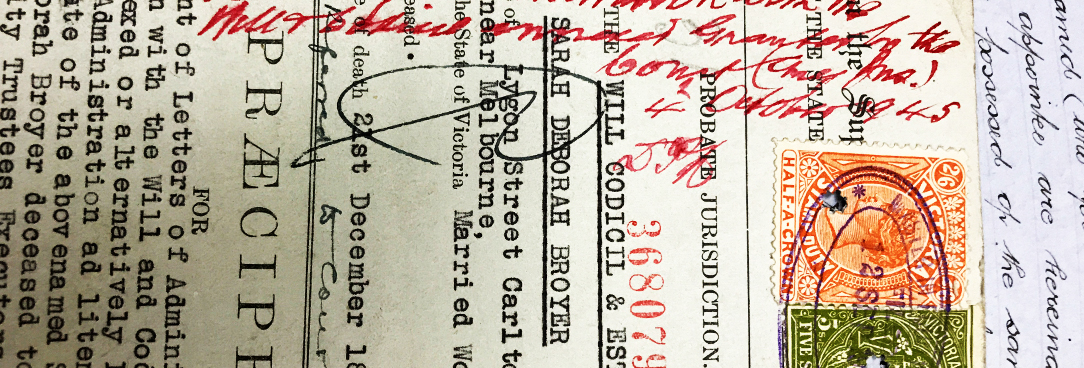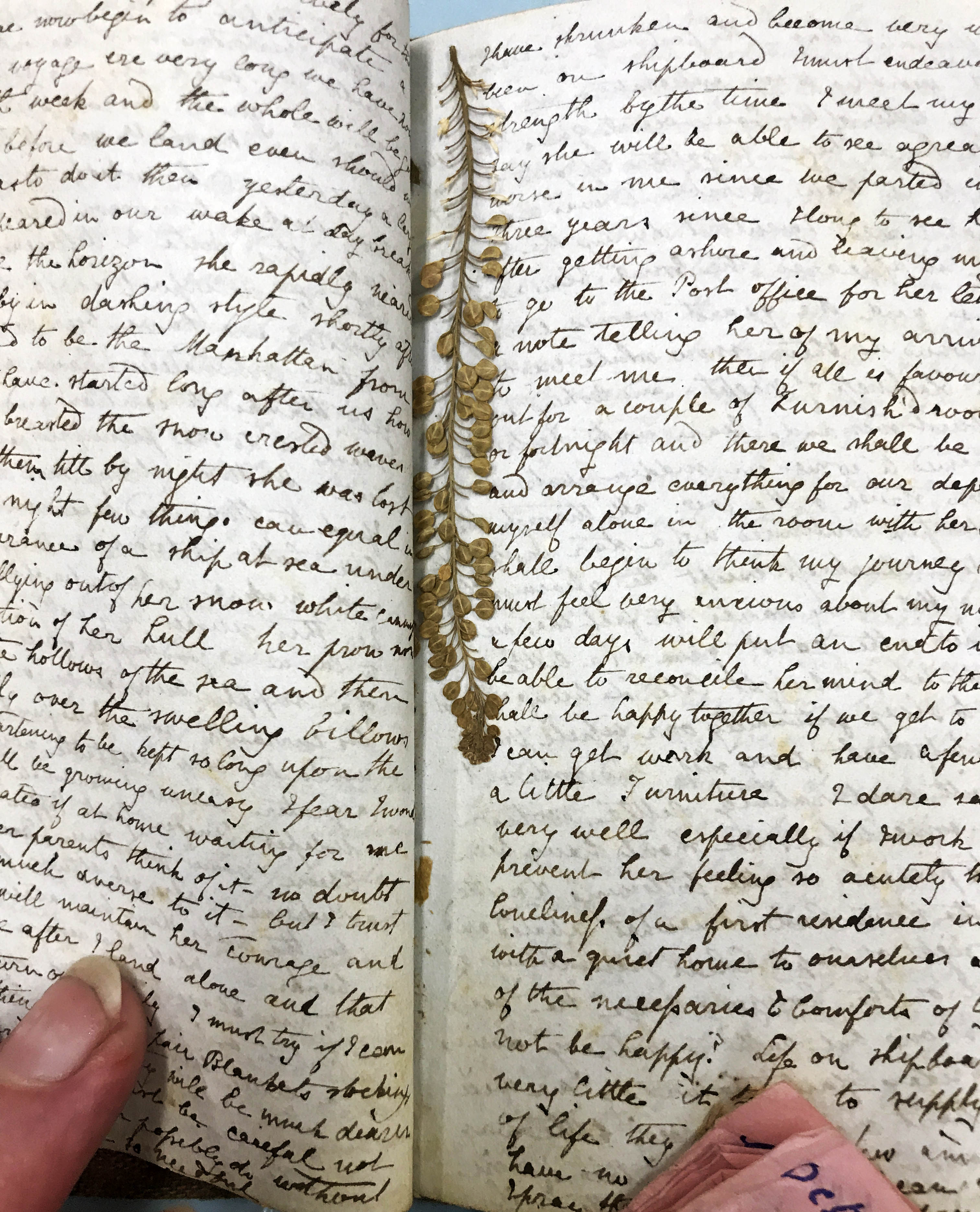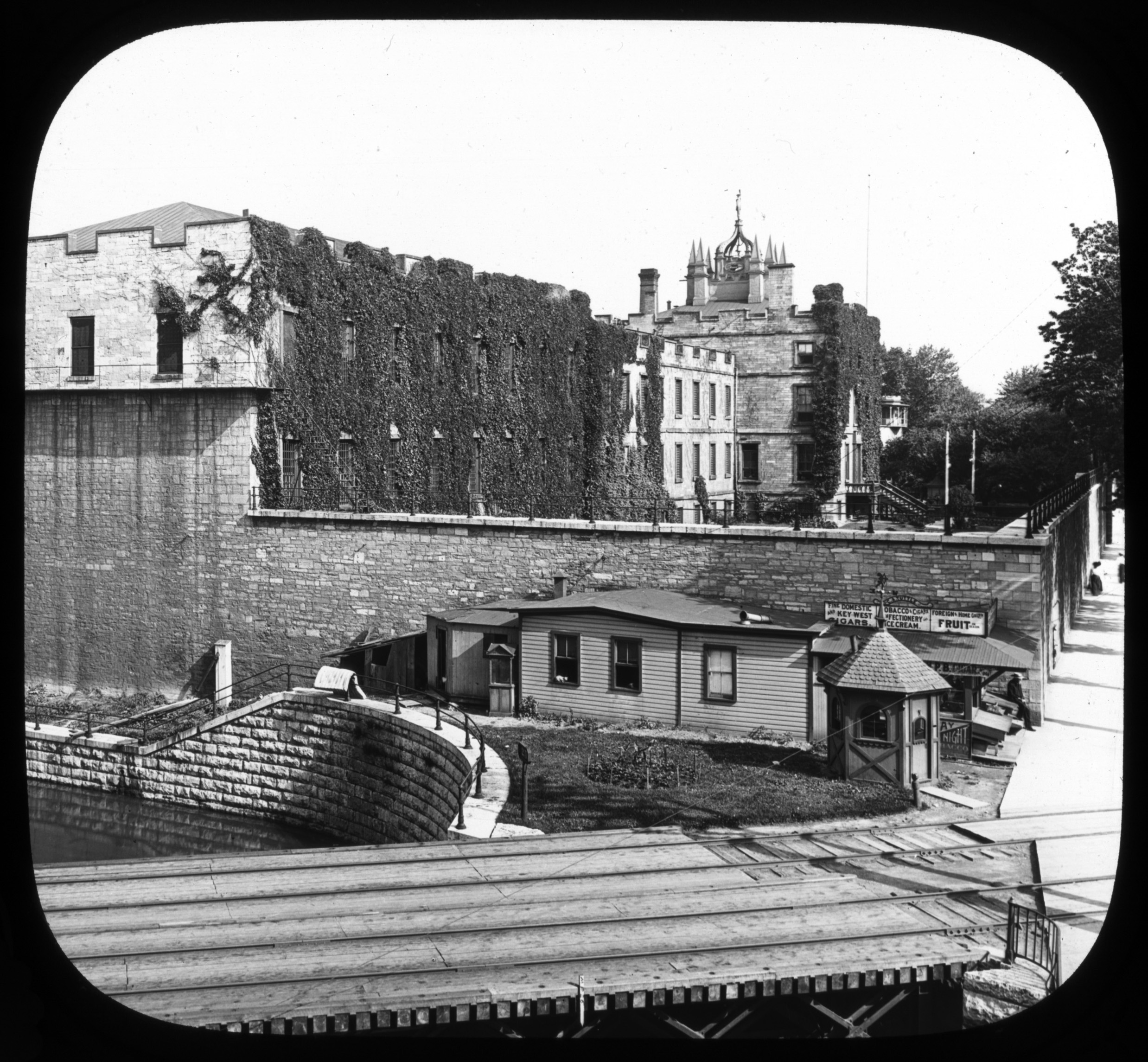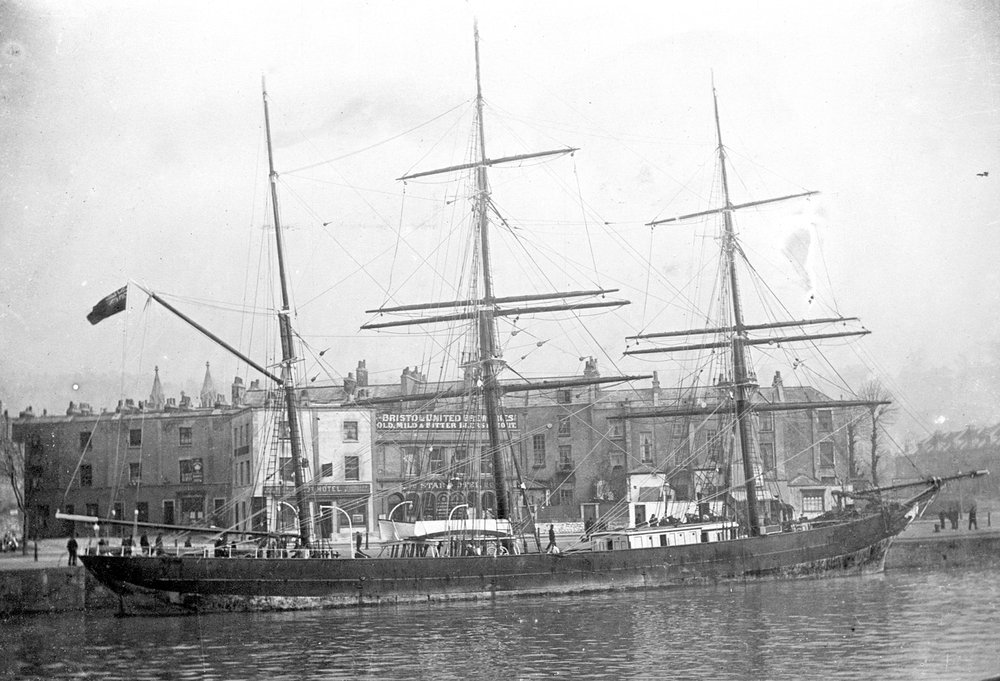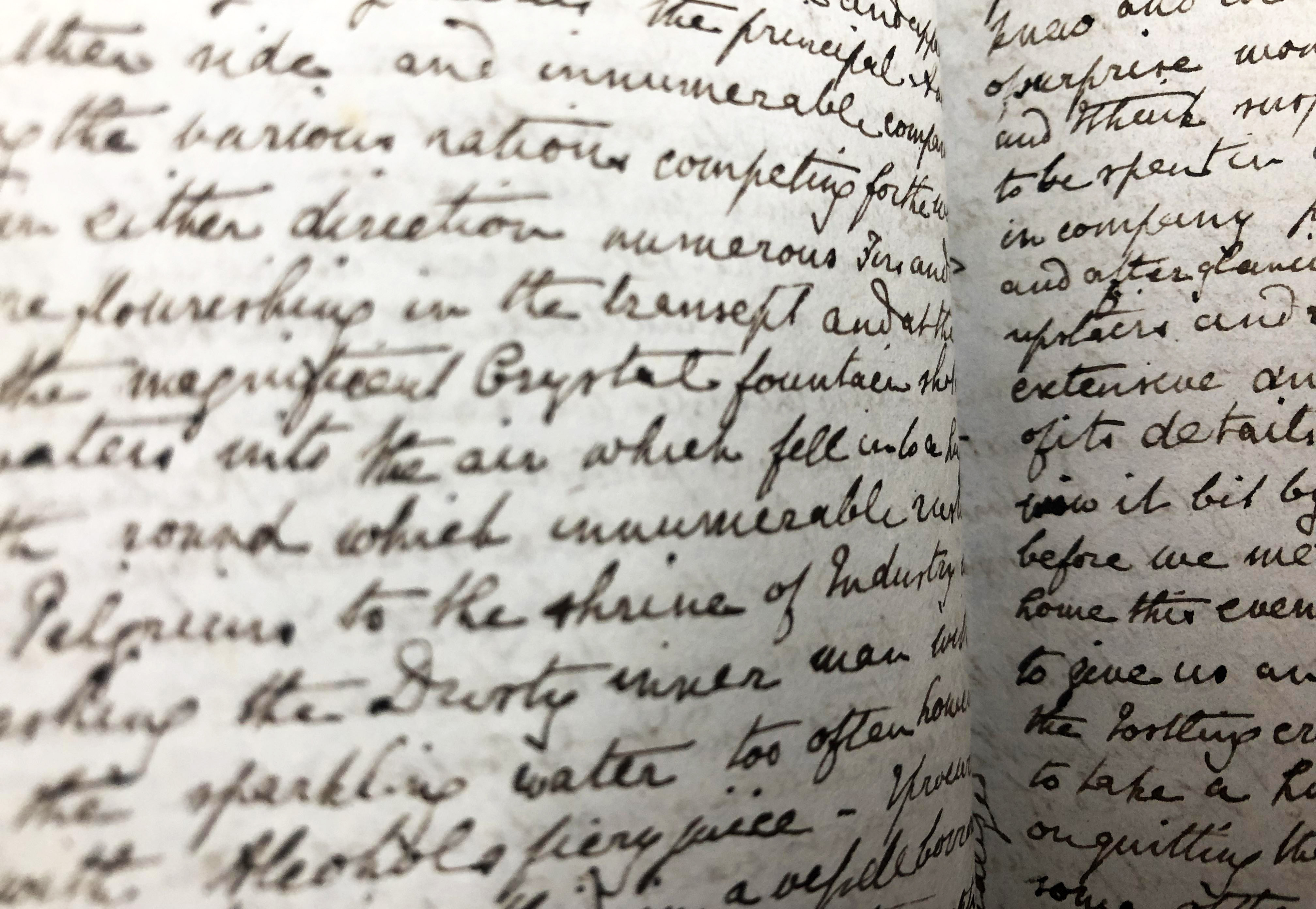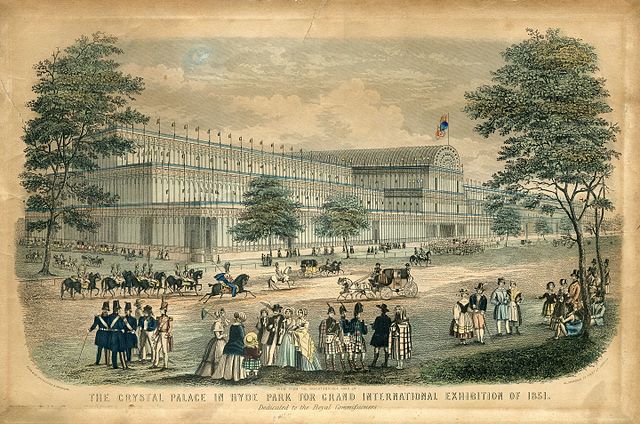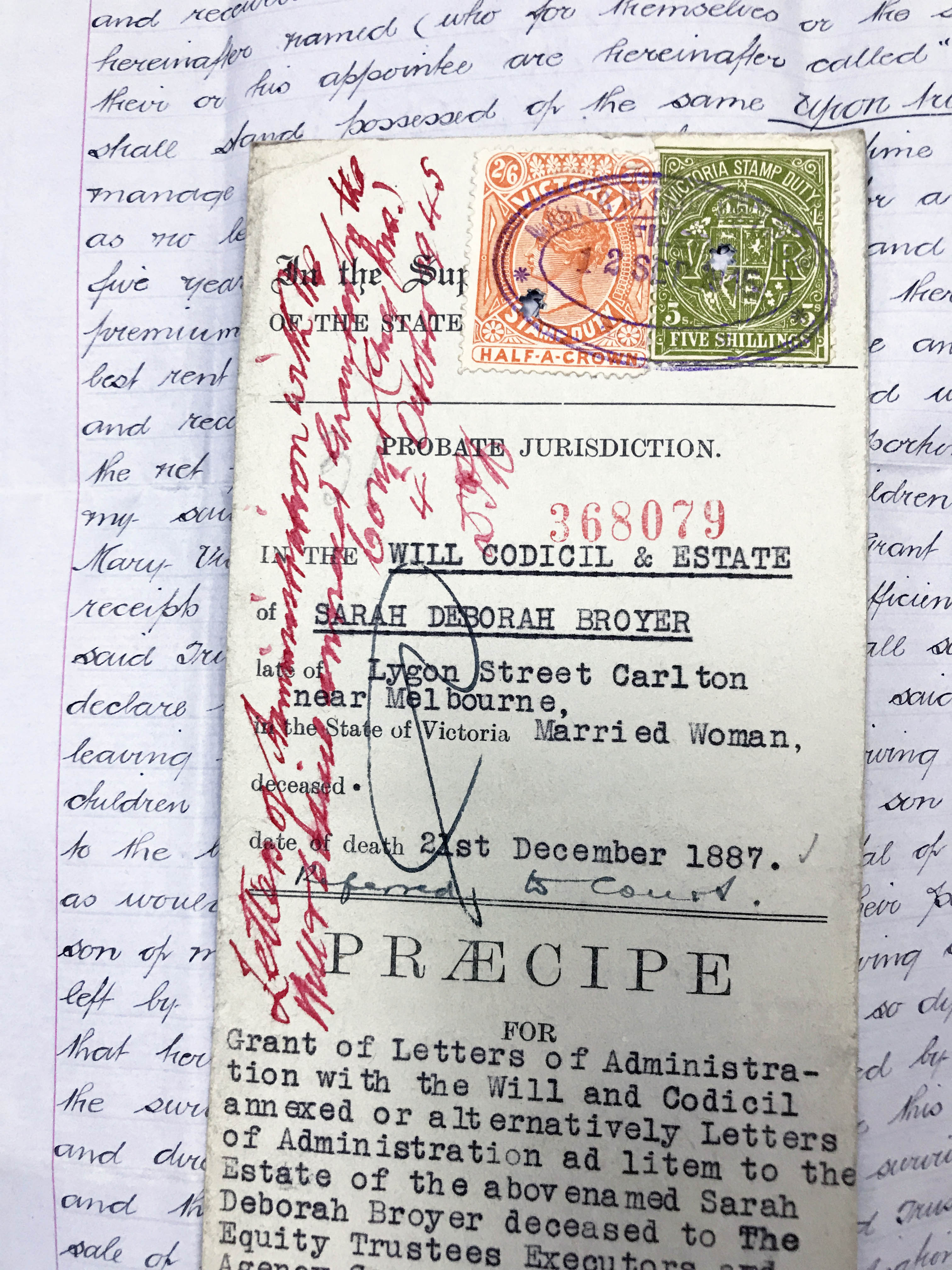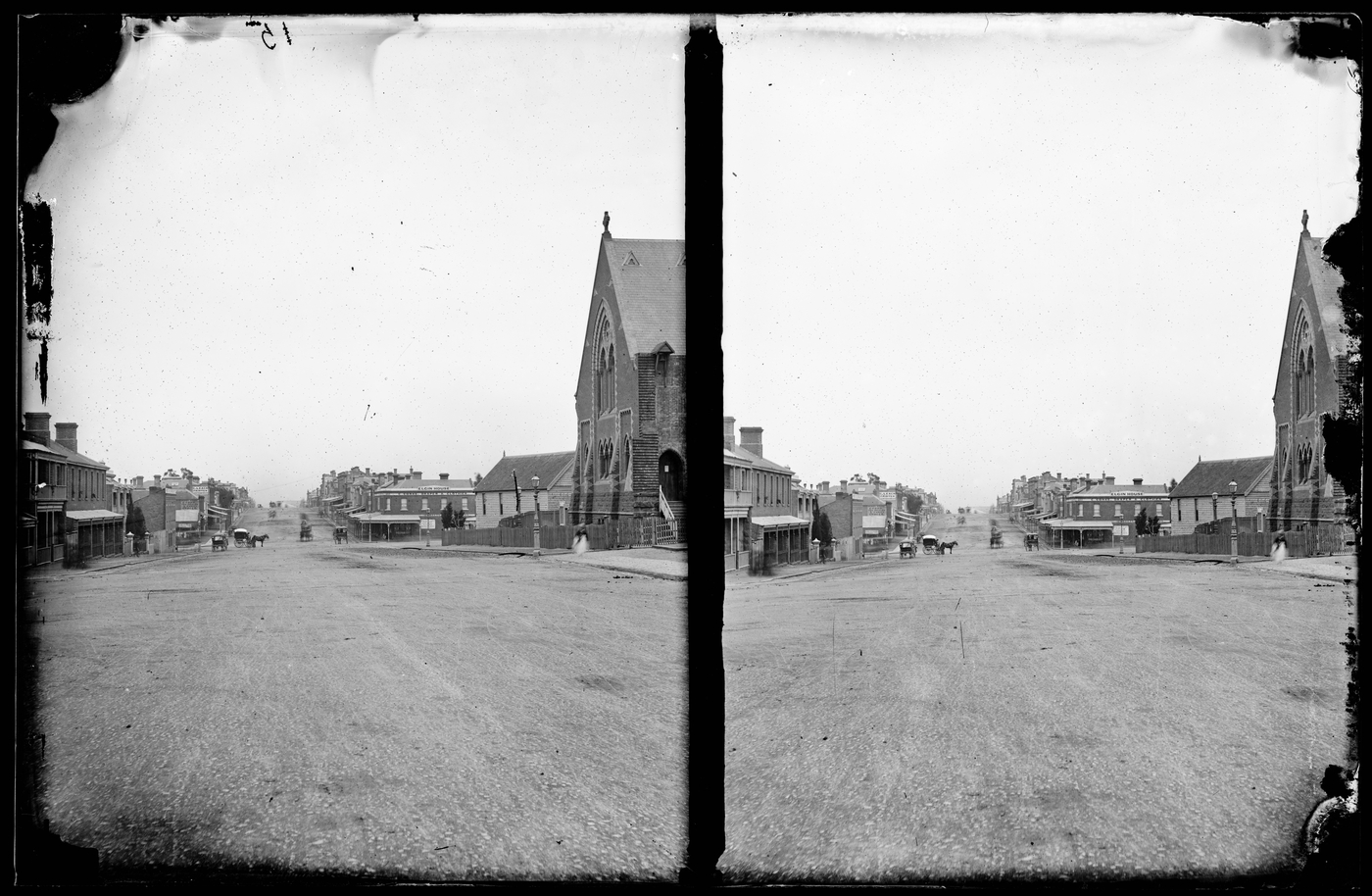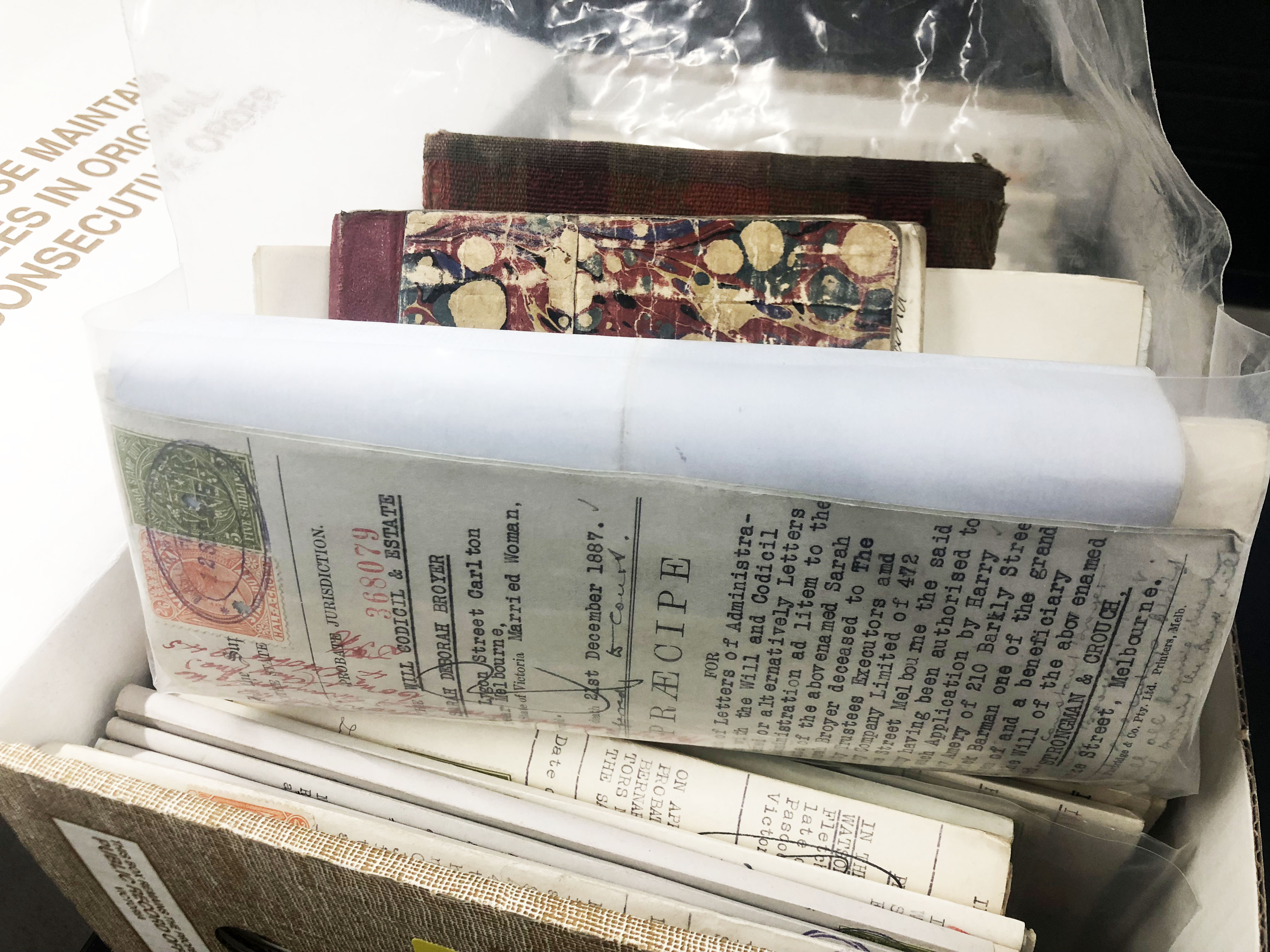
Author: Tara Oldfield
Senior Communications Advisor
Recently, while Family Search volunteers were digitising will and probate records held within our collection, they were amazed to come across a beautiful little diary, letters and notebook contained within the will of a woman named Sarah Deborah Broyer. By reading the records, you gain a sense of the lives of an entire family. Starting with Robert Amery.
Robert Amery’s diary 1851
Robert Amery was born in 1821 near Bath. He was neighbours with a young woman named Sarah who had a beau named Constant in a nearby parish. By 1851 Robert was living in America, but on hearing of Sarah and Constant’s break-up, he set off on a journey to England to win her heart.
His journey began in St Catherines Canada where he farewelled friends and rode off in a stage headed for Niagara Falls which he described as being as magnificent as ever. Initially intending to take a ferry, his fellow stage coach passengers convinced him that a train to New York would be faster, allowing him to meet the ship for Liverpool. Robert’s diary provides fascinating observations of what it was like traveling to New York at that time, including the scenery and people he encountered on his journey.
“…and in a few minutes the train started and we went rattling along at a great pace flitting by little groups of flowers through villages stopping at Attica, Batavia and Bergen til we arrived at Rochester. I could not procure a ticket at Buffalo there not being time before I started . I paid 1 dollar 50 cents to Rochester and there which we changed cars… We rolled on again at pretty good speed by people and such a variety of objects that it is impossible for me to remember them all. Some were extremely pretty for some time after leaving Buffalo the country looked rather flat and monotonous but after a while it became much livelier. I was much struck by the appearance of Auburn near which we remained some time on account of the engine becoming out of order. The State Prison had a very gloomy aspect sentinels were parading with fixd bayonets on the ramparts and through the grated windows some of the buried alive wretches were peering at us. The appearance of Odondaga Lake and the salt works there were very interesting at Syracuse which had a very bustling appearance indeed. We again changed cars we were considerably behind our time and were apprehensive of being too late for the boat at Albany. We were amused at the amorous pranks of a young couple in the car with us who were quite objects of amusement for us they not hearing the shouts of laughter with which we greeted each stolen kiss he gave her.”
From there, having “so far proceeded my journey in admirable style” Robert arrived in New York where he bided his time visiting friends and sightseeing, waiting for the Esmeralda to set sail. He even makes mention of coming upon the “notorious” Rynders who had gathered a mass meeting in a park. Robert Amery described in his diary that when another man tried addressing the crowd he was accosted by the mob and had to run to safety in a nearby store.
Upon finally boarding the Esmeralda, Robert’s diary reveals what six weeks on a ship was like at that time including the wonder of passing ships, the personalities and activities on board. He was often frustrated by how long it took the ship to depart and to arrive at Liverpool – understandable considering he knew Sarah would be waiting for him. He also goes into great detail about how much money he afforded himself for the trip and what food he ate throughout.
Monday 25 August 1851
“I am now once more upon the waters and once more the glad waves sweep around me.”
Here he reflects on the other passengers from England:
Sunday 31 August 1851
“The greater part of our passengers are English, many disappointed emigrants some who have only been here a few weeks and how bitterly most of them speak of the States and how their hearts yearn for home. Some have been wandering in the south and west for some time and at last dispirited and weary have yielded to the burning desire within them to ‘drink once more from the only fountain in the wilderness of life where waters are unmingled with bitterness.’ None appear very well satisfied with their adventures in this country but it is natural that the attachment to the scenes, friends and home of youth so universal should make us view each strange object with embittered feelings leading us often to reject even what is good before us and view everything through a discoloured medium.”
You can see love and worry reflected when writing about Sarah:
Sunday 7 September 1851
“I wonder when she leaves her situation and what her friends say about it they will indeed be surprised I am sure. I hope my friends will not obtain an inkling of it. I am afraid it will leak out one way or another were it not that I were returning to England without visiting them. I would not mind them knowing of her coming to me. I do hope I shall be able to make her a happy home and she can reconcile her mind to the great change. I feel my temper is sour and peevish. God grant I may never exhibit its bad traits towards her. I am afraid it will be a long time before I shall be able to surround her with the comforts she has been used to.”
On the same day, in vivid and elegant description, he noted:
“Very few incidents of importance have occurred during the past week. We have seen but very few vessels. One of a larger size bound probably for some Southern port passed us a few evenings since about sunset we were both going pretty well and passed each other at a dashing pace. How beautiful she looked flying over the billows like a bird borne upon her huge canvas wings and gradually disappeared in the deepening shades of evening the setting sun glowing upon her white sheets ‘she walked the waters like a thing of life and seemed to dare the elements to strife.’
The sunset has exhibited some pretty sights the gradual sinking of the glorious light its dipping in the water and lighting up the dancing waves with its lustre. The moon too which has been shining all through the past week has made our voyage much pleasanter – it’s lovely path among the billowy clouds through the blue depths of space the welcome rays spread over the wide prospect beneath. The pathway of shimmering light traced from our side to the horizon verge all these things under night doubly beautiful. This evening a small party assembled on deck and amused ourselves by singing verses of old hymns we had been accustomed to in infancy. How sweet those verses sounded on the still evening air. What a flood of long forgotten feelings rushed through my heart. Broken vows, withered hopes, pious aspirations, a melancholy creek floated over the ocean of my soul again to lie buried beneath its surface till some passing wind shall again bear it from the rest of oblivion.”
Sarah proves to be never far from his thoughts and he describes his nervousness yet anticipation of seeing her again after three years apart:
Tuesday 23 September 1851
“I have shrunken and become very weak since I have been on shipboard. I must endeavour to gather strength by the time I meet my little dear. I dare say she will be able to see a great change for the worse in me since we parted in Pulleney Road three years since. I long to see her.”
Sadly the pages of his meeting Sarah again seem to be torn out of the diary. Though he reveals upon arrival in England on the 1st of October:
“(I) called at the Post Office. The clerk at first told me there was nothing but on my asking him to look again he produced two letters directed in her familiar hand. I felt almost too much agitated to break the envelope. The post marks were Sept 9th and 12th. On throwing my eye over the contents my worst fears were confirmed. She had left her situation and was at home with her friends who were outrageous at the thought of her going to me and said she should not go, would not let her out and tried to prevent it altogether. She could not tell what to do, was in a sad way. Her father said she should not leave unless I returned and married her first. I felt quite bewildered on reading this. I walked about not knowing what to do sometimes inclined to hurry on board a vessel and return home directly. At last I returned to the house and wrote a few hurried lines stating I had arrived, shock her letters had given me, feared she did not love or confide in me, implored her to write directly a short note stating her latest resolve to the Post Office another to Hunter so that there may be no chance but I may get one. Also a few words to the Bristol Post Office in case I should get around there. I hardly knew what I said. Told her again it would be impossible for me to return home. I directed one of these letters as she desired to her sisters 11 Northumberland Place and the other to the Post Office so she may be sure to get one or the other. The clerk told me it would arrive in Bath tomorrow morning. After depositing them in the office I sallied out to try and discover some mode of killing time till my fate shall be sealed.”
Robert and Sarah married on the 10th of November 1851 in Bath, and left for New York soon after. Before their wedding Robert wrote in his diary of seeing the sights of England – providing an amazing snapshot of London at the time. The wilderness (yet unexpected cleanliness) of the streets, the constant stream of people in Hyde Park, and the Crystal Palace’s Great Exhibition:
Wednesday 8 October 1851
“we became in view of the world renowned Palace rising above the tall trees its round roof glittering in the sunbeams and a multitude of little flags streaming from the top. In a few minutes we came in full view of it. It occupied a very conspicuous position above the bank of the river on a green level space. What a striking object it appeared. The building alone seemed worth crossing the Atlantic to see.”
The Exhibition included galleries of different nations, giant marble statues, gold servery, glass models, and even machinery.
He was similarly impressed by the British Museum of which he wrote:
“Earth, Air and Ocean seemed to have been ransacked for specimens of their contents, the treasures of the Animal, Vegetable and Mineral Kingdoms seemed to have been brought there. I feel utterly lost in the contemplation of their extent. Room after room filled with specimens most admirably preserved of birds, beasts, reptiles, fishes, insects, etc.”
His diary ends with a few lines about meeting Sarah for tea, after which there are blank and torn out pages until the back of the book when in Sarah’s handwriting the following words have been written:
“Baby born the 5th of January 1853 at 9 o’clock in the morning Newark Avenue Jersey City State of New York America.”
This was baby Robert Francis Amery.
Overall Robert’s diary reveals a man with a keen appreciation for the built and natural environment, love of people and writing, and a hopeful passion for a future in America with his Sarah by his side. Sadly, their happily ever after was not to be. In an unknown person’s writing the diary ends with:
“Robert Amery buried in the Bergen Hill Cemetery Jersey City. Died 1854 at Marine Terrace Jersey city. Was manager for Mettars Jersey city.”
Robert Amery sadly died of cholera after only a short time with his wife and son.
Also contained within Sarah’s will is a letter from Sarah's niece Lizzie that reveals what happened next, including how Sarah's first love Constant (who she'd broken up with prior to marrying Robert) re-entered her life.
Lizzie Maidment’s letter 1944
The letter from Lizzie was sent from Station Road, Winslow Bucks, England to Phyllis Maude Ellis in Melbourne. Phyllis Maude was the daughter of (baby) Robert Francis Amery and his wife Phyllis Davey. An excerpt:
“My father and your grandmother was of course brother and sister… I expect you have heard all about your grandmother’s love affair, which I have many a time. Your grandmother was a very pretty girl (I have got her photo as a girl). When she grew up she had a lover who was passionately fond of her, he was a chemist in Chelsea (Mr Broyer). Anyway they had a tiff and she married your grandfather (Mr Amery) and I believe went to America. He died there and Aunt came back home to Grandmother Maidments her old home with her little boy (your father). My father was not married at that time so undertook to look after his sister’s little boy and fathered him while his sister went out as a wet nurse. But before she came home Broyer was so broken hearted over your grandmother getting married that he said he could not stay in England so sold his business and went to Australia. I believe lived in Lygon Street Melbourne… A man went into his chemist shop one day said could he give him something, he was not well. Thought the climate did not suit him. Broyer asked where he came from. He said England London, then Broyer asked what part, he said Chelsea. Then he asked the man did he happen to know anyone by the name of Maidment (not thinking he did). Oh yes the man said, know them well. Wanted to know if he knew Sarah, yes said the man. She is a widow and home.”
Lizzie goes onto explain that Constant Broyer wrote to Sarah asking for another chance. As a result she moved to Australia to marry him.
Sarah Deborah Broyer’s will 1887
Constant Broyer married Sarah Amery on 13 August 1860. They, with little Robert Francis, settled in Melbourne and went on to have three children together – Constance, Mary and Walter. None of these children ever married, but Robert Francis did. He married Phyllis Davey in 1885 and had six children – Rupert Francis, Phyllis Maud, Harry Stanley, Francis William, Reginald Benjamin and Edith Phyllis. Five grand-children were also born into the family.
Sarah died on the 21st of December 1887 leaving a handwritten will and testament. She described herself as the wife of Constant, Doctor of Medicine, living in Lygon Street Carlton. She left everything to her husband and three children (she surprisingly did not mention Robert Francis, the son of her first husband) though she also stated:
“that on the decease of the survivor of my said husband and three children that then my said trustees do proceed to a sale of my real estate and on the realisation thereof I will and direct that the proceeds be equally divided among such of my grandchildren as shall be then surviving.”
This is an important statement, as though Robert Francis is not directly mentioned, he was the only child of Sarah’s to produce her any grandchildren (and great-grandchildren). Also of interest within the will is that she listed her trustees as being her friends Alfred Deakin and Francis Longmore – later replaced by codicil by her husband and daughter as executers.
Documentation from 1945
According to further documentation within this record, submitted to the Supreme Court in 1945, Sarah owned the property of 64 Lygon Street, the place of business she ran with her husband under the name ‘Eclectic Medical Dispensary.’ Constant had signed the property over to her while he was away overseas obtaining his medical degree.
Sarah herself was one of the first female pharmacists in Victoria and sold ‘Mrs Broyer’s female remedies’ including cures for toothaches and coughs. The record further states that:
“During Constant Broyer’s absence in America Mrs Broyer carried on the business at 64 Lygon Street, she being a qualified chemist, and being assisted by her four children, of whom Robert Francis Amery would then have been aged about 24. Constant Broyer, however, returned to Melbourne and the parties lived together again… About 1885, Robert Francis Amery married Phyllis Davey at Carlton; and she is still alive, being now aged 84. They carried on the chemist’s shop, apparently under some arrangements with Dr and Mrs Broyer. After Mrs Broyer’s death, Robert Francis and his family continued in the shop at Lygon Street under an arrangement with the Broyers.”
After the death of Constant Broyer all property went to the Broyer children, though Robert Francis continued working at the Pharmacy until his own death. Sometime later Robert Francis’ son Francis William Amery and his family stayed at Mary Broyer’s house while she was on holiday. She directed him, his wife and daughter that they could clean up the house. While they did so they came across Sarah’s will among other papers related to the property of Lygon Street. They shared these papers with the other grandchildren. Mary Broyer died in 1944, the last of the Broyer line (Constance and Walter had all passed years prior).
So what is the relevance of a family diary and letter to the will of Sarah? An affidavit by Phyllis Maude Ellis details that the diary of Robert Amery includes a page written by Sarah, this was used to cross check her handwriting against her will. The letter from Lizzie was also included as evidence of Robert Francis Amery as being Sarah’s son and therefore the children of Robert Francis Amery beneficiaries of Sarah’s estate.
Robert Francis Amery’s notebook undated
The affidavit of Phyllis Maude Ellis also makes mention of Robert Francis Amery’s notebook, also included within the petition as evidence. Robert seemed to have inherited his father’s love of note-taking particularly in relation to expenditures. His notes include details on how to handle finances – perhaps passed down to his children.
“Buy your cheque books with stamps impressed. Never sign anything without looking first to see if it is properly stamped… Look carefully at your deeds, one error may invalidate an important transaction…”
Four generations of a family tree are all revealed by Sarah’s will and contents of her grandchildren’s petition as beneficiaries (five generations if you include Sarah's father General Maidment who is also briefly mentioned in the documents). Tales of love, loss, family, career, money and property spanning almost 100 years and three continents are all wrapped up in one bundle, in our collection within Unit 4189 of series VPRS 28 P3.
Reference
Additional information for this blog post was gained from the fantastic paper by David Haig. If you'd like to gain even further insights into the lives of Sarah, Constant and family I recommend reading it: David, Haig. 2012. Sarah and Constant Broyer, Pharmacist and Physician, of Carlton. Victorian Historical Journal 83(2): 178-196.
Material in the Public Record Office Victoria archival collection contains words and descriptions that reflect attitudes and government policies at different times which may be insensitive and upsetting
Aboriginal and Torres Strait Islander Peoples should be aware the collection and website may contain images, voices and names of deceased persons.
PROV provides advice to researchers wishing to access, publish or re-use records about Aboriginal Peoples
